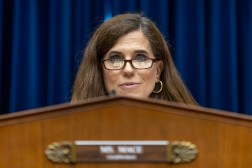What a new administration can do to make open data flourish
Opening government data and making it more useful has been a focus of the Obama administration, and a new report released Monday seeks to show the next administration how to build on those gains.
The Center for Open Data Enterprise’s report includes pointers that affect four groups: government data users and providers, citizens, researchers, and businesses. Among the 27 action items were recommendations to define, fund and appoint chief data officers in each agency; conduct a national data infrastructure review of federal grants that support local, tribal, state and federal data; and create a centralized public database of FOIA requests.
The administration implemented some structural support for open data and started programs that encourage data dissemination and use, Center for Open Data Enterprise President Joel Gurin said at an event Monday launching the report.
“All of this has been really fantastic progress, but is actually not enough,” Gurin said of that work. “And the reason it’s not enough is that many of these open data policies, and programs and resources rely on the White House or specific agency leadership, and that’s all going to change in the months and years ahead. Not all of it, but a lot of it will shift. So we really need to institutionalize the gains that have been made and build on them in new and innovative ways.”
Many open data advocates are pushing for the passage of the Open, Public, Electronic and Necessary Government Data Act, which would make the administration’s open data policy memo law.
But the report notes that “the OPEN Act’s passage is not certain.”
“Moreover, the scope of open government data is so broad that it will need additional organizational and political support to fully realize its potential,” the report says. “There is a critical need to reaffirm and build upon the government’s commitment to open data with sustainable infrastructure, policies, practices and resources that are not dependent on any one administration.”
The report is organized around four overarching goals for improving open data policy and programs, one of which is to open more scientific research data.
“Every scientist would like to be able to access, use and disseminate research data faster,” said Sage Bionetworks Chief Commons Officer John Wilbanks in a statement. “The Open Data Transition Report promotes data sharing and shows why scientific data must be treated as a public good.”
To open more scientific research data, the report recommends establishing a Federal Research Data Council to coordinate efforts and developing an annual census of research data.
“We really are seeing a very rapidly growing international movement that says science has to be open,” Gurin said. “We need to share data more effectively than we’ve done.”
U.S. Patent and Trademark Office Director Michelle Lee said Monday the agency’s efforts in this space are important because patent data is a very early source of information indicating where research is going.
Lee noted the agency has recently released a set of APIs that can help people mine the repository of patent data for trends.
She also discussed the office’s work to release relevant data related to cancer for Vice President Joe Biden’s Cancer Moonshot Initiative. USPTO challenged people to use that data to create visualizations that could empower government to make funding and policy decisions.
Lee said they received more than 19 submissions in less than a month.
“These ideas are just beginning to scratch the surface of prospects of how this data can be used to change the world, or in this case, how to accelerate the cure for cancer,” she said. “And I’m very excited about these possibilities and the impacts of this open, accessible approach to government data.”
When it comes to creating a leadership structure within agencies that supports opening data, the report recommends the Office of Management and Budget issue guidance that explains the role and responsibilities of chief data officers and encourages each agency to appoint one.
“We got a lot of input that the chief data officer structure that many agencies now have has the potential to be incredibly powerful, but only if it’s really defined, well-funded and well-supported,” Gurin said Monday.
The report also recommends the Council on Financial Assistance Reform conduct a 100-day National Data Infrastructure Review, which Gurin noted is significant because the presidential candidates have been focusing on infrastructure.
“If you think about it, data is actually part of infrastructure, and data and knowledge is actually critical to guiding other infrastructure investments,” he said.
The center consulted with nearly 60 subject matter experts while creating the report. The center also drew on an analysis it published earlier this month that came out of a series of open data roundtables co-hosted by the White House Office of Science and Technology Policy.
[Read more: Report: Federal open data needs better feedback channels]
That analysis called for better feedback channels on open data quality, which this report also recommends.
“The Office of Science and Technology Policy should write a memo by January 2018 to provide guidance to all agencies to use direct feedback mechanisms, including crowdsourcing, to improve data quality, and request that agencies engage with their data to identify errors and clean data sets,” the report reads.






